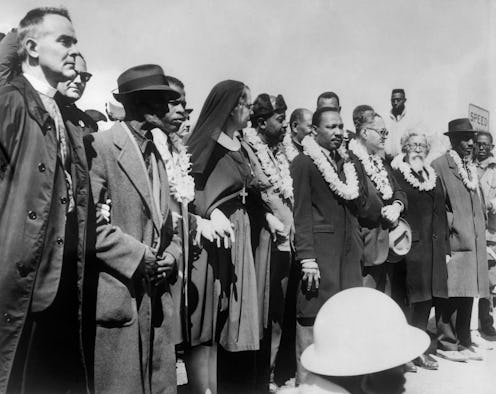News
It's Been 50 Years Since The Selma Marches
On Sunday, March 7, 1965, 600 people set out on foot from Selma, Alabama, planning to march to the state's capital of Montgomery. Protesting the lack of voting rights for African-Americans, the marchers didn't make it very far before they were stopped by Alabama state troops. The troops beat them back from the Edmund Pettis Bridge with tear gas, nightsticks, and whips. The marchers set out again two days later, but were again beat back and finally managed to travel from Selma to Montgomery from March 21 to March 25. If you think you can guess who led all these marches, you're probably right — it was the legendary Dr. Martin Luther King, Jr., then aged 36, who pioneered the now-famous Freedom March of 1965.
The efforts of King and his thousands of supporters made national news, but what really convinced President Lyndon Johnson to pass the Voting Rights Act of 1965 was the police's brutal attack on the marchers on March 7. Though the peaceful protests of the civil rights activists were moving, ultimately it was this violence that made waves politically. According to the United States Department of Justice:
Finally, the unprovoked attack on March 7, 1965, by state troopers on peaceful marchers crossing the Edmund Pettus Bridge in Selma, Alabama, en route to the state capitol in Montgomery, persuaded the President and Congress to overcome Southern legislators' resistance to effective voting rights legislation.
That first attempt at marching on March 7 became known as Bloody Sunday, recently freshly memorialized in the 2014 film Selma , starring David Oyelowo. Though the film was originally conceived as an historical drama, it gained unexpected press, popularity, and above all relevance after a fall season racked with racial unrest.
Many fans thought the film was snubbed at the 2015 Academy Awards — it was passed over for top awards at several ceremonies, including the Golden Globes and SAG Awards, and took home only one Oscar for Best Original Song. But the film's Oscar win highlighted the highly topical issue of police brutality, perhaps even more than a Best Picture win would have — the lyrics to "Glory," by John Legend and Common, include the following lines: "Resistance is us / That's why Rosa sat on the bus / That's why we walk through Ferguson with our hands up." In an interview with the New York Daily News, Common said:
It’s a song for right now. Everything about the song is about the present. It resonates with what we see going on in the country, in Ferguson, other cities, and in the world.
It's true that some things haven't changed much since King led the Freedom March in Alabama 50 years ago — or rather, some things are still the same. How different is the civil rights landscape today than it was in 1965, when activists risked their lives standing up for their right to vote? On the 50th anniversary of the historical Selma marches, here are four important ways America has — and hasn't — changed since that pivotal era.
Police Brutality
Has it changed? Not as much as we'd like. While there have not quite been any more Bloody Sundays, the rash of violence between police and protesters since the death of Michael Brown in August 2014 has led to a massive peak in national interest in police brutality.
And this isn't for nothing — sparked by the media attention to the Ferguson riots and protests, the American Civil Liberties Union has found that "intolerable" racism within police departments is widespread across the U.S.
Political Awareness
Has it changed? Yes and no. President Obama has made it crystal clear that he thinks remembering the anniversary of the historic marches is an important priority. But none of the White House's primary Republican leaders are showing the same values. While Obama will visit Selma on Saturday to commemorate the marches, House Speaker John Boehner, Majority Leader Kevin McCarthy, and Majority Whip Steve Scalise are all sitting this one out. Why aren't any Republicans going to Selma? Your guess is as good as mine. Maybe they're all busy. But as Chris Cillizza writes for the Washington Post:
Especially at a time when Ferguson — among other incidents — has catapulted concerns about racism to 25-year highs, symbolism matters. Republican leaders should be savvy enough to grasp that fact and get someone to Selma on Saturday.
Residential Segregation
Has it changed? Somewhat (are you seeing a trend here yet?). While it is now super illegal to segregate anything on the basis of race, residential neighborhoods' makeup continues to follow old patterns of income segregation based on race. In a 2000 New York Times article entitled "The Lost Promise of School Integration," Jeffrey Rosen quoted Samuel Issacharoff of Columbia Law School:
Fifty years after Brown versus Board of Education, there is still no non-coercive mechanism for racial integration that has evolved in this country.
Selma, The City
Has it changed? It's in the works. While Selma, Alabama, remains a very poor and mainly black city — about 80 percent of the population is black, and 42 percent of the city's residents live below the national poverty line — there are signs that this historical landmark of a city may be looking at a revitalization. Though unemployment is high at 10.2 percent in December 2014, it's down from 10.7 percent in December 2013. And new job opportunities are popping up — according to The Wall Street Journal, a business incubator for startups has sprouted in Selma, and there are plans for residential and business redevelopment underway.
Images: University of Virginia School of Medicine (1)
